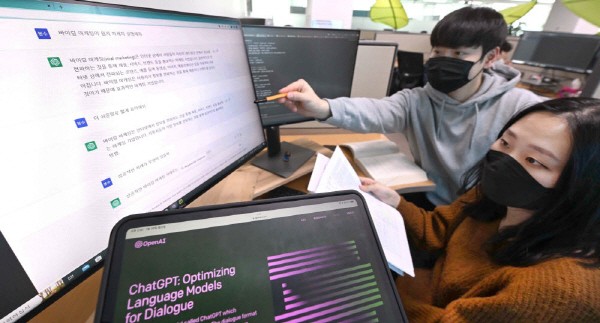Determines quality of AI service with quality data
Revision of copyright and personal information protection laws
Creating an environment for companies to focus on R&D

It was pointed out that revisions to data-related laws were urgently needed for the growth of Korean AI services, such as for a Korean version of ‘ChatGPT’, and the corresponding ecosystem. As the use of quality data can determine the quality of AI services, it was argued that it was necessary to revise related laws to increase the competitiveness of the nation’s industry in a short period.
On the 30th, industry and academic experts in the field of data argued that the swift passage of laws, such as revision bills for the Copyright Act and the Personal Information Protection Act, which are tied up at the National Assembly, is the prerequisite for introducing a Korean version of ChatGPT. Their idea is that it is necessary to hurry up in revising Korean legal systems to respond to the competition of generative AI of big tech sparked by ChatGPT.
The bill ‘Restriction of Author’s Property Rights when Copying and Transmitting for Information Analysis’, proposed by Representative Yongho Lee, stipulates that copyrighted works may be reproduced and transmitted without obtaining permission from the author’s owner if it is being used for information analysis (data mining) purposes. However, it has not yet been able to cross the legal threshold. In a bill review report, the Culture, Sports, and Tourism Committee stated that “The UK, Germany, and Japan have amended their copyright laws and explicitly allow reproduction for information analysis,” and said that, “Given the legislative trends of major countries, the need for revision is recognized.”
The ‘Amendment to the Personal Information Protection Act’ (personal information pseudonymization) and the ‘Act on Promotion of Digital Healthcare and Promotion of Utilization of Health and Medical Data’ (use of medical data) are also pending in the National Assembly. The amendment to the Personal Information Protection Act includes policies to promote the data economy, such as pseudonymous information and My Data. When the system is implemented, the amount of utilized data limited to some industries and the public will increase, making it possible to develop AI services using data for each industry.
The core of the 'Act on Promotion of Digital Healthcare and Promotion of Health and Medical Data Utilization' is the use of health and medical data. The application of AI technology is active in the healthcare field. The bill is projected to support the development of AI services using pseudonymization of health and medical data and invigoration of big data research.
Jungwoo Ha, the Chief of Naver Cloud AI Lab, said that, “For ultra-large AI such as ChatGPT, it is essential to learn a correspondingly huge amount of data to produce better results,” and said that, “Rather than limiting the operation of the technology itself by taking a conservative approach to issues such as intellectual property rights of learning data and copyright of generated products, it is important to form a social consensus by allowing many people to use ultra-large AI.”
Kyungjin Choi, the Chairman of the Korean Artificial Intelligence Association (Gachon University Professor), said that, “In addition to chatbots such as ChatGPT, it is necessary to utilize data in various fields such as music and medicine, but companies and researchers are not able to easily go for the challenge due to copyright and other legal issues,” and pointed out that, “Companies can only focus on R&D without shrinking away when the government or the National Assembly resolves legal issues, such as with copyrights.”
Chairman Choi also said that, “In order for data to be used without fear from an R&D perspective, revisions to relevant laws and follow-up measures must continue.”
Reporter Jisun Kim river@etnews.com